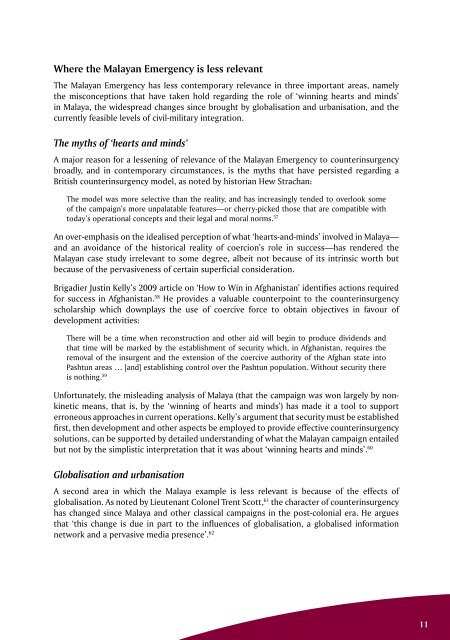ISSUE 191 : Jul/Aug - 2013 - Australian Defence Force Journal
ISSUE 191 : Jul/Aug - 2013 - Australian Defence Force Journal
ISSUE 191 : Jul/Aug - 2013 - Australian Defence Force Journal
- No tags were found...
Create successful ePaper yourself
Turn your PDF publications into a flip-book with our unique Google optimized e-Paper software.
Where the Malayan Emergency is less relevant<br />
The Malayan Emergency has less contemporary relevance in three important areas, namely<br />
the misconceptions that have taken hold regarding the role of ‘winning hearts and minds’<br />
in Malaya, the widespread changes since brought by globalisation and urbanisation, and the<br />
currently feasible levels of civil-military integration.<br />
The myths of ‘hearts and minds’<br />
A major reason for a lessening of relevance of the Malayan Emergency to counterinsurgency<br />
broadly, and in contemporary circumstances, is the myths that have persisted regarding a<br />
British counterinsurgency model, as noted by historian Hew Strachan:<br />
The model was more selective than the reality, and has increasingly tended to overlook some<br />
of the campaign’s more unpalatable features—or cherry-picked those that are compatible with<br />
today’s operational concepts and their legal and moral norms. 57<br />
An over-emphasis on the idealised perception of what ‘hearts-and-minds’ involved in Malaya—<br />
and an avoidance of the historical reality of coercion’s role in success—has rendered the<br />
Malayan case study irrelevant to some degree, albeit not because of its intrinsic worth but<br />
because of the pervasiveness of certain superficial consideration.<br />
Brigadier Justin Kelly’s 2009 article on ‘How to Win in Afghanistan’ identifies actions required<br />
for success in Afghanistan. 58 He provides a valuable counterpoint to the counterinsurgency<br />
scholarship which downplays the use of coercive force to obtain objectives in favour of<br />
development activities:<br />
There will be a time when reconstruction and other aid will begin to produce dividends and<br />
that time will be marked by the establishment of security which, in Afghanistan, requires the<br />
removal of the insurgent and the extension of the coercive authority of the Afghan state into<br />
Pashtun areas … [and] establishing control over the Pashtun population. Without security there<br />
is nothing. 59<br />
Unfortunately, the misleading analysis of Malaya (that the campaign was won largely by nonkinetic<br />
means, that is, by the ‘winning of hearts and minds’) has made it a tool to support<br />
erroneous approaches in current operations. Kelly’s argument that security must be established<br />
first, then development and other aspects be employed to provide effective counterinsurgency<br />
solutions, can be supported by detailed understanding of what the Malayan campaign entailed<br />
but not by the simplistic interpretation that it was about ‘winning hearts and minds’. 60<br />
Globalisation and urbanisation<br />
A second area in which the Malaya example is less relevant is because of the effects of<br />
globalisation. As noted by Lieutenant Colonel Trent Scott, 61 the character of counterinsurgency<br />
has changed since Malaya and other classical campaigns in the post-colonial era. He argues<br />
that ‘this change is due in part to the influences of globalisation, a globalised information<br />
network and a pervasive media presence’. 62<br />
11

















